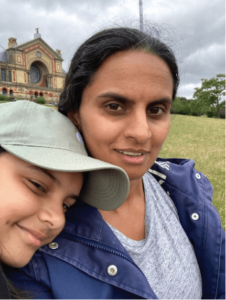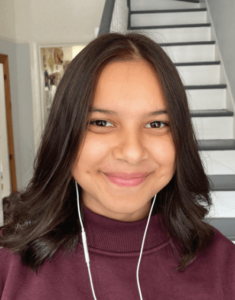01 Aug Amy Was the Centre of Our Family, And Suddenly She Was No Longer Here


By Beewan Atwal, Mother of Amy (06/12/08 – 12/06/20)
My daughter Amy was not expected to die. Amy had no illness or injury, there was no warning. She went to sleep one night and did not wake up. I found her, on a Sunday morning. She was 12 and a half. I thought she was sleeping a little longer than usual, as we’d had a few late nights that week. I went into her room to wake her and she was unnaturally cold. Death had taken hold during the night. There was a horror and panic, seeing a dead body, and because it was my little girl who was dead. She was nearly my height, just half a centimetre away. The day before she had been to her dance class, watched movies and been so very alive and full of joy. Her death is unexplained, nothing physically wrong with her body apart from the glaringly obvious fact that she died.
That is the place where we start our grief: the shock, the sudden unexpected death of our child. The horror, that our child has died. And the trauma of finding her and not knowing why she died.
In the days and weeks following my daughter’s death, my body ached for hers. I felt a physical hole in my chest, a pain so real I was sure that if I was to be x-rayed that they would find a large piece of me had been carved away. My body reacted to the loss of my child; I felt like my breasts were full as though I had recently stopped breastfeeding. Everything was primal and raw, a mother without her child.
I cried a cry that I have never heard or felt before, one that comes from a place so deep within my body, with echoes of the past. The cry was animalistic and it moved through my body without permission or control.
For months I sat in my daughter’s room, convinced that I would die too. Surely that would be the only fair thing to happen. I have paved the way for my children, experienced life before them. I should be dead too before them to guide my daughter in death. How could this happen? Death did not come to me, the cardiologist we were referred to couldn’t find anything wrong with us. I was tested again and again, waiting for them to say we have found something and you will die too. Nothing was found, I have to admit I was disappointed.
I went to a bereaved parent group called SLOW. When my husband and I first attended, we joined via zoom as COVID had us in lockdown. One of the mothers said that it had been 20 years since she lost her daughter. It shocked me; how could anyone live that long without their child? I remember thinking, “I don’t want that, that would be too cruel.” We carried on going to the group, and I heard of how other families have lost their children: it’s all terrible, no matter how they die, simply because children should not die. I am struck by how much the parents find it hard to hold their grief and navigate in the “normal” world now. No one knows how to deal with grief in our society, and it seems that other people’s behaviour contributes to the trauma of losing a child.
We are now a horror story that other people tell each other about. What can happen to a normal family on a normal day. Friends who are parents have distanced themselves, I suspect out of self-preservation. The knowledge that a child can die any moment and without apparent cause is too much for the parents we know. They are able to look away and throw a cloak over this tragedy. We have no choice, as this is our existence now.
I also had friends who just stepped up and helped. The best ones just witnessed and sympathised without trying to fix us. They walked with me as I told them the horror, and they held me as I cried. They didn’t look away or expect me to “move on.” These are my special friends now as they found a strength to help me. Therapy is ongoing but in the first year I found talking therapy as a couple helpful as we both grieved differently and we needed to understand each other as well as understand what we were individually going through. EMDR was horrific to do but it shifted the trauma and opened up so many other memories of Amy. I also did acupuncture for grief, which I really appreciated as I didn’t have to talk, I could go and just cry in a room.
Slowly, I developed rituals to help me. I needed to get out of our house on Sundays as I found Amy on a Sunday. I struggled to find things to do; but one day, I went to the flower market, and I just kept going back each Sunday to buy flowers for Amy. We now know quite a few of the stall holders and feel part of the Sunday community at the market. Choosing flowers, arranging them, plus tending to them is something I do for Amy.
We also light a candle to Amy each day. So many religions and cultures have a fire ritual to connect this world to the spiritual world, which I like. The glow from the candle also makes our space feel more emotionally warmer.
Most importantly, for me, is that I write to Amy each day. This started three days after she died. I don’t know what made me start to do it. I think I wanted to physically communicate with her and holding pen to paper felt connected. I write each day. It gives me a little space to be with my thoughts about Amy. I really value this time.
It is just over two years now since we lost Amy. I still want her every day, and I think I always will. I am a different person since Amy died. Death is very real, very random and cruel, and it walks beside us. I have deeper friendships and better boundaries. I have hope for the future and am determined to live a life that I can tell Amy about when I see her again. I would hate for her to think her legacy to us was sorrow and misery. She was a very bright, joyous, positive and loving person and in our first year of grief, we often asked what Amy would do in a situation. We try to live in a meaningful connected way.


